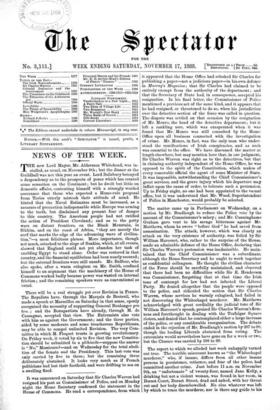The matter came up in Parliament on Wednesday, on a
motion by Mr. Bradlaugh to reduce the Police vote by the amount of the Commissioner's salary; and Mr. Onnn inghaine Graham gave vent to his savage bitterness against Mr. Matthews, whom he swore "before God" he had saved from assassination. The attack, however, which was clearly an attack on the very existence of authority, was foiled by Sir William Harcourt, who, rather to the surprise of the House, made an admirable defence of the Home Office, declaring that Sir Charles Warren's pretension was inadmissible. He main.. tamed that the Chief Commissioner was a subordinate, although the Home Secretary and he ought to work together as confidential colleagues. He thought the civilian character of the Force should be carefully maintained, and observed that there had been no difficulties while Sir E. Henderson was Commissioner, forgetting that at that time the Irish tone of contempt for law had not infected the Liberal Party. He denied altogether that the people were opposed to the police, and ridiculed the notion that Sir Charles Warren, whose services he warmly eulogised, had failed in not discovering the Whitechapel murderer. Mr. Matthews acknowledged with great cordiality the judicial tone of Sir William Harcourt's speech, praised Sir Charles Warren's firm.. ness and forethought in dealing with the Trafalgar Square rioters, and denied that he contemplated either a large increase of the police, or any considerable reorganisation. The debate ended in the rejection of Mr. Bradlaugh's motion by 207 to 90, though the leading Liberals abstained from voting. The extremists would nevertheless have gone on for a week or two, but the Closure was carried by 198 to 89.


















































